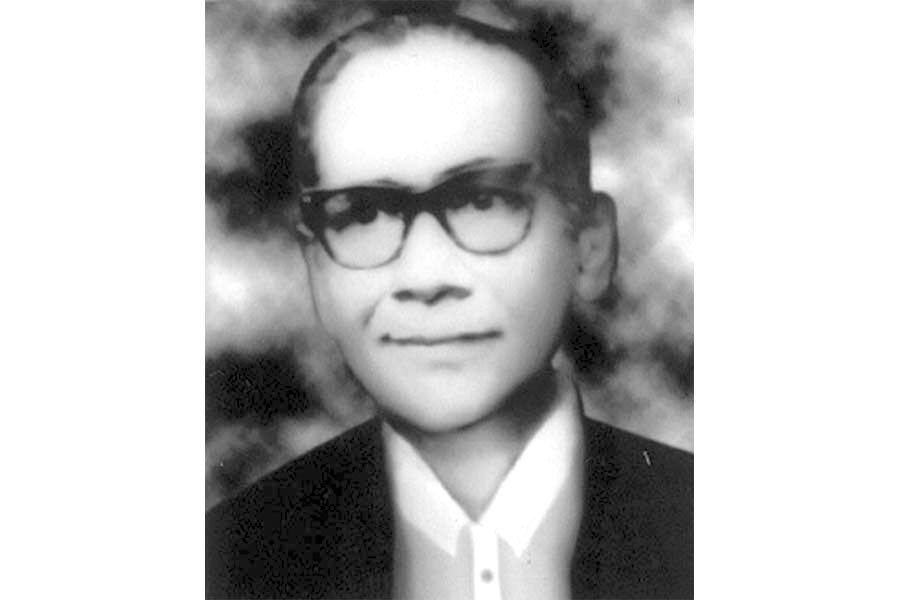"A drop of ink makes millions think." I am told by a very senior journalist as well as by a very elderly advocate that the late Chief Justice Syed Mahbub Murshed used to say this. Justice Murshed was the most prominent enlightened personality of his times and it was this enlightenment or this beacon of light that he wanted to pass on to his fellow countrymen. What late Allama Iqbal was to his part of the world, Murshed was to his native Bangladesh: "A friend, philosopher and guide." He was indisputably our nation's most articulate advocate of human rights and civil liberation.
Murshed had been a votary of discipline throughout his life. He had a brilliant academic career and became a barrister from the honourable society of Lincoln's Inn at London. In reality, he was an academician till the end of his life. He was a scholar of the highest eminence.
Despite his aristocratic background, Murshed had his roots in the people. He always tried to ensure more benefits to the people.. Justice Murshed did this with the depth of poetic and mystical visions and maintained a fine balance enriched by religious and moral fervour.
In the latter part of 1954, Murshed was elevated to the bench of the Dhaka High Court. As a judge, he remained committed to his lifelong ideals of liberty, justice and excellence. His judicial pronouncements delivered, while sitting in the bench of the Dhaka High Court and the Supreme Court of Pakistan briefly as an ad-hoc judge in 1962 plus as Chief Justice, reflected his ideals of judicial independence. Some of his judgments created constitutional history and won for him international acclaim.
Justice Murshed was firmly committed to the ideals of democracy and at upholding the cause of justice even against extreme odds. He kept afloat the flag of liberty in defiance to all kinds of pressures.
I would like to mention what some intellectuals said about this legend. The late Justice Abu Sayed Chowdhury said, "Justice Murshed in his judgments reached correct decisions indicating the boldness of his mind. He gained fame for his wisdom and intelligence, as well as deep respect of the public as he was fearless. It was Justice Murshed, the man, who had for many years with courage dauntlessly upheld the rule of law and had administered justice without fear or favour, despite severe pressure." Justice Abdur Rahman Choudhury in his tribute said "a giant has passed away, a giant in the legal field, a giant amongst the jurists and a giant in his own right. For those of us who had the privilege of knowing Justice Murshed intimately, his death is too overwhelming for words and too deep for tears." "In life and in death he was a king without the trappings of a monarch, for he built an empire in the hearts of his fellowmen", said Justice K M Sobhan. The great Mr H S Suhrawardy called Murshed "an unfailing protector of civil liberties." In his analysis Justice Mustafa Kamal stated, "Justice Murshed presented himself as the colourful personality of wisdom both inside and outside the court." Syed Ishtiaque Ahmed observed that "when true history of the 20th century is written, the period from early 1955 to late 1967 might as well be called the age of Murshed."
A little over five decades ago, when our country was under alien rule, when those who governed our country from more than a thousand miles away were determined to impose their culture upon us and erase our cultural heritage, it was Murshed from the Bengali intellectuals who stood up to fight for the age-old traditions and cultural identity of Bangladesh. It will always be remembered that he organised in 1961 the "Tagore Centennial celebrations" at Dhaka and other parts of the country and this was in defiance of the opposition of the then-Pakistani rulers. When the great tide of nationalism, which swept the country in the 1970s, originated from ripples that were noticeable in the fifties and sixties, the distinguished person who figured most prominently in this process was Syed Mahbub Murshed. The fight for a separate identity became, through a process of metamorphosis, a battle for nationalism. The stirrings of a nation in the making in the late 1950s and 1960s found eloquent expression and these were reflected in the manifold speeches, judgments and writings of Justice Murshed. In this sphere, he became the most articulate spokesman of Bengali nationalism.
During the famine in 1943 and later the communal riots in 1946, Murshed worked actively with the 'Anjuman Mafidul Islam.' Remaining the humanist that he was in the late 1950s and early 1960s of the last century, he became the President of the Red Cross. Deep down, Murshed was a Sufi and a liberal Muslim and spoke of tolerance which was against any form of communalism.
At a critical time in our history when the country was sensing a victory for autocracy with President Field Marshal Ayub Khan about to celebrate his so-called decade of reforms and the Agartala conspiracy case was being framed, Murshed resigned from the post of Chief Justice to join the masses for the fight for democracy. Among the first things that he did was to help organise the defence of the Agartala Conspiracy case and subsequent to this, he entered politics directly, which gave a major momentum to the anti-Ayub movement. Perhaps what is most significant was that during the round-table conference while Ayub was virtually on his knees, Justice Murshed demanded one man one vote. During our war of liberation, he refused to collaborate with the ruling military junta. He was a keeper of our national conscience. (The article has been abridged)
Barrister M Tamijuddin is a practising lawyer with Chambers at London and a researcher on the life and times of Justice Murshed.


